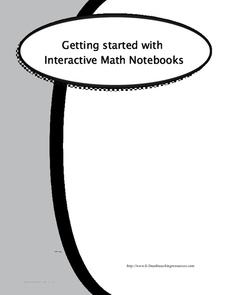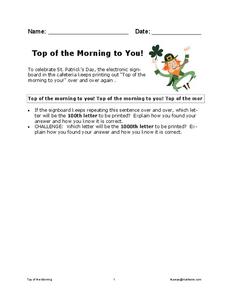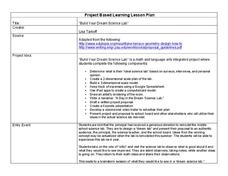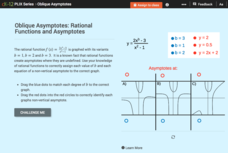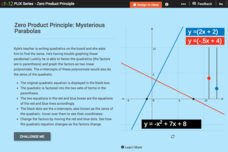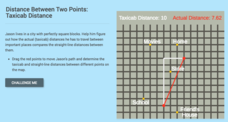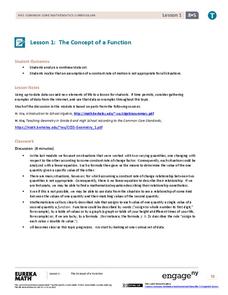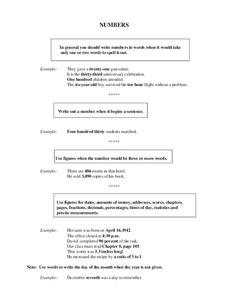Curated OER
Getting Started with Interactive Math Notebooks
Set young mathematicians up for success with this interactive math notebook. Including a list of rules and expectations for using the notebooks, as well as templates for a creating a cover page and table of contents, this resource...
Illustrative Mathematics
Accuracy of Carbon 14 Dating II
The scientific issue of carbon-14 dating and exponential decay gets a statistics-based treatment in this problem. The class starts with a basic investigation of carbon content, but then branches out to questions of accuracy and...
Mathwire
Top of the Morning to You!
O' Lucky charms! its time for a leprechaun riddle to challenge your learners. So kick those heels in the air and river dance your way to solving this stimulating St. Patrick's Day math question.
Pearson
End of Year Practice Test (Grade 8 Math)
This is a great resource to keep daily material aligned to standardized assessments. It offers complete multiple choice and short-answer practice with a wealth of opportunities for customization. Offer it as a whole,...
CK-12 Foundation
Line Graphs to Display Data Over Time: Strawberry Competition
Take the tediousness out of graphing. Using the interactive tool, learners can efficiently create a line graph from a set of data. They then use the graph to answer questions about specific trends in the data.
EngageNY
Mid-Module Assessment Task: Grade 8 Module 2
It's time for a concept check! Check for student understanding over the three types of rigid transformations. The assessment follows the first 10 lessons in this series and to test pupils' proficiency of these concepts. Individuals...
Curated OER
Build Your Dream Science Lab
Would your ideal science lab be filled with bubbling beakers and zapping Tesla coils? Or would it contain state-of-the-art computer technology and data analysis? Dream big with an innovative lesson that connects math and language...
CK-12 Foundation
Broken-Line Graphs: Heating Curve of Water
Examine the unique graphs coined broken-line graphs. Using the phase change of water for data, learners answer questions related to the temperature and energy at different times in the cycle of the phase change. Questions focus on the...
101 Questions
Bottomless Mug
How much coffee can you actually drink? An intriguing lesson has learners consider an advertisement for a bottomless mug of coffee. While considering the price of the mug, they analyze different scenarios to determine the cost-saving...
Houghton Mifflin Harcourt
Simple and Compound Interest
Your learners will get lots of practice calculating simple and compound interest by the end of this lesson. Simple explanations and examples lead learners through the concepts and steps of calculating simple and compound interest...
EngageNY
How Do Dilations Map Angles?
The key to understanding is making connections. Scholars explore angle dilations using properties of parallel lines. At completion, pupils prove that angles of a dilation preserve their original measure.
Howard County Schools
Drawing Inverses
An Algebra II lesson draws the connection between the exponential function and its inverse. By graphing an exponential function and using tables and a calculator, young scholars graph the logarithmic function. The plan comes with a...
CK-12 Foundation
Oblique Asymptotes: Rational Functions and Asymptotes
Examine the connection between rational functions and their graphs. Individuals use an online manipulative to sort equations with horizontal and oblique asymptotes. They focus on the degree of the numerator and denominator.
CK-12 Foundation
Multiplication of Rational Expressions
There's nothing irrational about this lesson. Explore the process of multiplying rational expressions through discovery. A well-designed lesson has learners factor and multiply rational expressions by dragging factors to the correct...
CK-12 Foundation
Zero Product Principle: Mysterious Parabolas
Be a hero, not a zero! Help your classes understand how to solve quadratic equations with the zero product property using an animated simulation. Using the controls, scholars manipulate the zeros and watch as the function and its factors...
CK-12 Foundation
Sum and Difference of Cubes: Stacking Blocks
Investigate polynomial factoring patterns by finding a connection to volume. As learners build a three-dimensional solid from smaller solids, they convert the visual model to a mathematical expression. Their models represent the sum of...
CK-12 Foundation
Midpoint and Segment Bisectors: Finding Treasure with Geometry
Send your class on the hunt for a buried treasure and apply geometry skills along the way. An engaging lesson uses direction and midpoint locations to find the location of a treasure. Videos provide background information to complete the...
CK-12 Foundation
Distance Between Two Points: Taxicab Distance
Apply geometry to find the distance as the crow flies. An engaging lesson compares the distance a car must drive to the straight line distance between two locations. Scholars must manipulate a simulation, note the change in distances,...
CK-12 Foundation
Angle Measurement: Fuel Gauge Angles
Once you start looking, angles appear everywhere in our daily lives. A creative lesson has learners use the angles created by a fuel gauge to practice the Angle Addition Postulate. They see how changing the angle parts does not...
EngageNY
End-of-Module Assessment Task: Grade 8 Mathematics (Module 7)
It's time to discover what your classes have learned! The final lesson in the 25-part module is an assessment that covers the Pythagorean Theorem. Application of the theorem includes distance between points, the volume of...
EngageNY
The Concept of a Function
Explore functions with non-constant rates of change. The first installment of a 12-part module teaches young mathematicians about the concept of a function. They investigate instances where functions do not have a constant rate of change.
Pearson
Performance Based Assessment Practice Test (Algebra II)
A full-length practice test like this one, especially one that includes a number of open response questions, is a phenomenal tool in a class as rigorous as algebra 2. Here the learners can really get that hands-on experience...
National External Diploma Program Council
Numbers
The written form for 345 is three-hundred forty-five, where as the word form for 70% is seventy percent. Here, young mathematicians read 10 sentences and write the word form of each number in the sentences.
C-SPAN
Polling and Public Opinion
Most people are eager to offer their opinions about topics of interest, but what's the most effective way to collect and assess these opinions as a matter of fact? High schoolers learn about the history of polling, as well as the...
